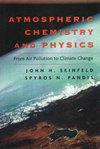北极中部高时间分辨率和粒度分辨气溶胶化学成分和微尺度观测:对气候相关粒子特性的影响
IF 5.1
1区 地球科学
Q1 ENVIRONMENTAL SCIENCES
引用次数: 0
摘要
摘要气溶胶在北极的辐射平衡中起着至关重要的作用,根据其物理化学特性(如大小、丰度和化学成分)影响太阳辐射和云的形成。对北极中部地区的观测有限,导致对全年气溶胶动力学的了解存在差距,影响了模型对气候相关特性的预测。在此,我们介绍了在北冰洋2018(AO2018)和2019-2020年北极气候研究多学科漂流观测站(MOSAiC)考察期间对北极中部亚微米气溶胶化学成分进行的首次年度高时间分辨率观测。研究发现,气溶胶质量浓度和化学成分的季节性变化是由典型的北极季节机制驱动的。有机气溶胶在原始夏季占主导地位,而人为硫酸盐则在秋季和春季北极雾霾条件下占主导地位。与北极低纬度地区相比,影响气溶胶酸度的铵在北极中部的含量始终低于硫酸盐。研究发现,气旋(风暴)活动对气溶胶的变异性有显著影响,它既能增强本地气溶胶的排放,也能增强远距离气溶胶的传输,在秋季(春季),本地风力产生的颗粒占云凝结核数量的比例高达 80%(20%)。本文的分析提供了当前北极中部气溶胶的基线,有助于改善该地区的气候模式预测,同时也强调了在模式模拟中整合短时尺度过程的重要性,例如吹雪和开阔引线/海洋产生的季节性风驱动气溶胶源,特别是考虑到中纬度人为排放影响的下降和本地人为排放的增加。本文章由计算机程序翻译,如有差异,请以英文原文为准。
Observations of high time-resolution and size-resolved aerosol chemical composition and microphyscis in the central Arctic: implications for climate-relevant particle properties
Abstract. Aerosols play a critical role in the Arctic’s radiative balance, influencing solar radiation and cloud formation based on their physicochemical properties (e.g., size, abundance, and chemical composition). Limited observations in the central Arctic leave gaps in understanding aerosol dynamics year-round, affecting model predictions of climate-relevant properties. Here, we present the first annual high-time resolution observations of submicron aerosol chemical composition in the central Arctic during the Arctic Ocean 2018 (AO2018) and the 2019–2020 Multidisciplinary drifting Observatory for the Study of Arctic Climate (MOSAiC) expeditions. Seasonal variations in aerosol mass concentrations and chemical composition were found to be driven by typical Arctic seasonal regimes. Organic aerosols dominated the pristine summer, while anthropogenic sulfate prevailed in autumn and spring under Arctic haze conditions. Ammonium, which impacts aerosol acidity, was consistently less abundant, relative to sulfate, in the central Arctic compared to lower latitudes of the Arctic. Cyclonic (storm) activity was found to have a significant influence on aerosol variability by enhancing both emission from local sources and transport of remote aerosol, with locally wind-generated particles contributing up to 80 % (20 %) of the cloud condensation nuclei population in autumn (spring). While the analysis presented herein provides the current central Arctic aerosol baseline, which will serve to improve climate model predictions in the region, it also underscores the importance of integrating short-timescale processes, such as seasonal wind-driven aerosol sources from blowing snow and open leads/ocean in model simulations, especially in light of the declining mid-latitude anthropogenic emissions influence and the increasing local anthropogenic emissions.
求助全文
通过发布文献求助,成功后即可免费获取论文全文。
去求助
来源期刊

Atmospheric Chemistry and Physics
地学-气象与大气科学
CiteScore
10.70
自引率
20.60%
发文量
702
审稿时长
6 months
期刊介绍:
Atmospheric Chemistry and Physics (ACP) is a not-for-profit international scientific journal dedicated to the publication and public discussion of high-quality studies investigating the Earth''s atmosphere and the underlying chemical and physical processes. It covers the altitude range from the land and ocean surface up to the turbopause, including the troposphere, stratosphere, and mesosphere.
The main subject areas comprise atmospheric modelling, field measurements, remote sensing, and laboratory studies of gases, aerosols, clouds and precipitation, isotopes, radiation, dynamics, biosphere interactions, and hydrosphere interactions. The journal scope is focused on studies with general implications for atmospheric science rather than investigations that are primarily of local or technical interest.
 求助内容:
求助内容: 应助结果提醒方式:
应助结果提醒方式:


